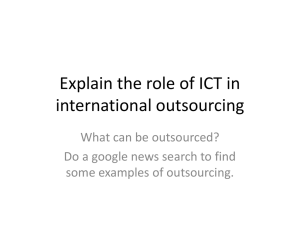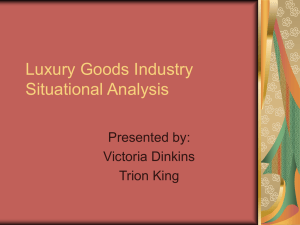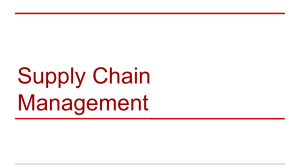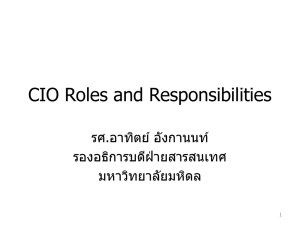Chapter 1: Ethical Considerations in Outsourcing Decisions
advertisement
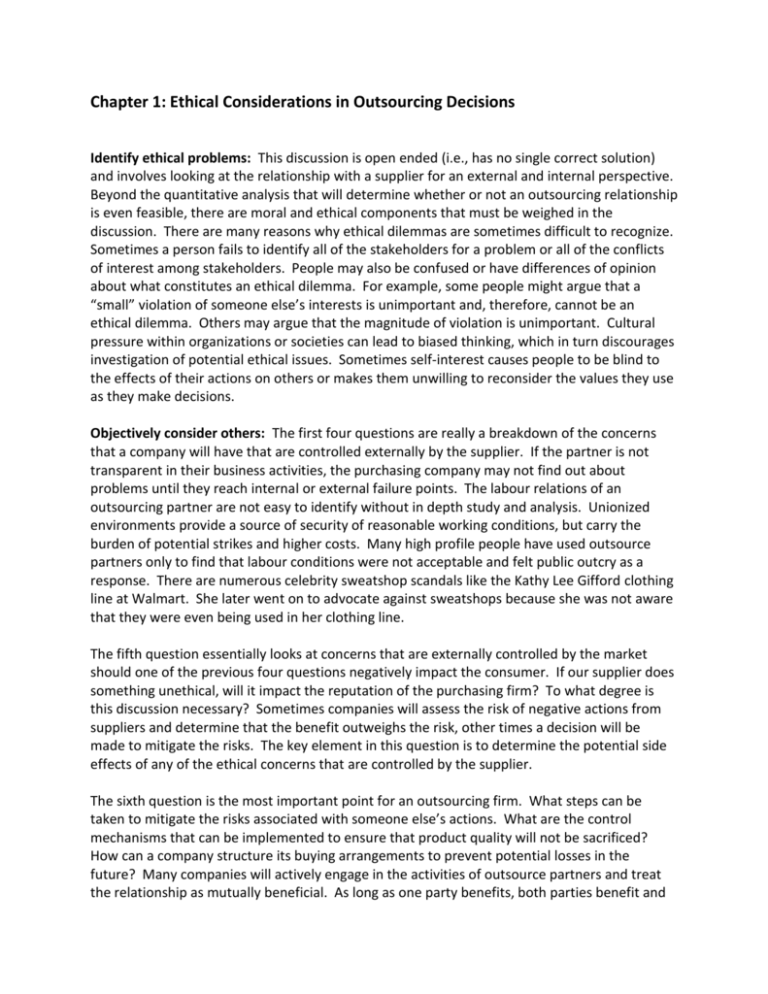
Chapter 1: Ethical Considerations in Outsourcing Decisions Identify ethical problems: This discussion is open ended (i.e., has no single correct solution) and involves looking at the relationship with a supplier for an external and internal perspective. Beyond the quantitative analysis that will determine whether or not an outsourcing relationship is even feasible, there are moral and ethical components that must be weighed in the discussion. There are many reasons why ethical dilemmas are sometimes difficult to recognize. Sometimes a person fails to identify all of the stakeholders for a problem or all of the conflicts of interest among stakeholders. People may also be confused or have differences of opinion about what constitutes an ethical dilemma. For example, some people might argue that a “small” violation of someone else’s interests is unimportant and, therefore, cannot be an ethical dilemma. Others may argue that the magnitude of violation is unimportant. Cultural pressure within organizations or societies can lead to biased thinking, which in turn discourages investigation of potential ethical issues. Sometimes self-interest causes people to be blind to the effects of their actions on others or makes them unwilling to reconsider the values they use as they make decisions. Objectively consider others: The first four questions are really a breakdown of the concerns that a company will have that are controlled externally by the supplier. If the partner is not transparent in their business activities, the purchasing company may not find out about problems until they reach internal or external failure points. The labour relations of an outsourcing partner are not easy to identify without in depth study and analysis. Unionized environments provide a source of security of reasonable working conditions, but carry the burden of potential strikes and higher costs. Many high profile people have used outsource partners only to find that labour conditions were not acceptable and felt public outcry as a response. There are numerous celebrity sweatshop scandals like the Kathy Lee Gifford clothing line at Walmart. She later went on to advocate against sweatshops because she was not aware that they were even being used in her clothing line. The fifth question essentially looks at concerns that are externally controlled by the market should one of the previous four questions negatively impact the consumer. If our supplier does something unethical, will it impact the reputation of the purchasing firm? To what degree is this discussion necessary? Sometimes companies will assess the risk of negative actions from suppliers and determine that the benefit outweighs the risk, other times a decision will be made to mitigate the risks. The key element in this question is to determine the potential side effects of any of the ethical concerns that are controlled by the supplier. The sixth question is the most important point for an outsourcing firm. What steps can be taken to mitigate the risks associated with someone else’s actions. What are the control mechanisms that can be implemented to ensure that product quality will not be sacrificed? How can a company structure its buying arrangements to prevent potential losses in the future? Many companies will actively engage in the activities of outsource partners and treat the relationship as mutually beneficial. As long as one party benefits, both parties benefit and therefore it is in the best interests of both parties to behave in a manner consistent with their ethical beliefs. The codes of ethics of the different accounting designations (CA, CGA, and CMA) are helpful in determining the congruence of organizations and are helpful in helping a professional to consider the wellbeing of others and society. Many of the standards are written from the perspective of providing strong consideration of others in providing service that has the interests of others (e.g. “A member or student has a duty of confidence in respect to the affairs of any client and shall not disclose, without proper cause, any information obtained in the course of his or her duties, nor shall he or she in any way exploit such information to his or her advantage.” from the Rules of Professional Conduct of The Institute of Chartered Accountants of Newfoundland). Such standards serve as a useful reference to help define some facets of consideration for the wellbeing of others. Clarify and apply ethical values: Values such as reliability, responsiveness, communication, integrity, loyalty and the multitude of business philosophies that can come into decision making are very important in determining if an outsourcing partner is going to be a good fit for the purchasing organization. It may also be difficult to identify which values are most important in a given setting. For example, internally managers may be faced with an ethical dilemma over the extent of employee layoffs during an economic downturn if an outsourcing partner is engaged. Managers may need to weigh a value of loyalty and commitment to employees against a value of generating higher profits for shareholders. Externally these values may not be displayed in the behavior and policies of outsourcing partner. Some of the values that might be used my managers in this decision are as follows. Value: Managers should take actions that maximize company profits. The ultimate goal of most companies is to earn a profit and therefore this value will come to the front of this decision. Value: Managers should ensure the long term viability and sustainability of the firm. If outsourcing is required to keep the firm viable, then this value will take precedent over many of the labour discussions. Value: Managers should take actions that are most fair to employees. If outsourcing is just an attempt to increase profits for the sake of greed, then this value should be considered in terms of the long term impact on the firm in other areas such as employee morale and loyalty. Work toward ongoing improvement: In addressing this, it is important to understand the basic assumptions behind the need to find an outsourcing partner. If it is an operational matter in that the internal operations are not capable of handling the capacity or facilities are too old, then the search should be based on a physical need of the company. If, however, the outsourcing is merely to improve the profitability of the firm, then it would be easier to overlook the unethical practices of an outsourcing partner. Due diligence in either case should be the foremost consideration so that a firm will know with certainty the actions and values of an outsourcing partner.

